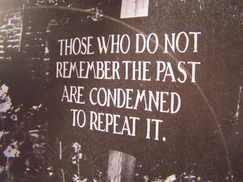 Click for a larger image Click for a larger image At some point in our lives we’ll reflect on and reminisce about the good old days. We'll talk about how we had simpler life. We’ll say “I’m glad I’m not a young person today, there are so many hurdles they have to navigate. We did not have to deal with gun violence, student debt, high unemployment, failing schools, and a myriad of other issues that our youth are facing today”. We’ll tend to forget that there were challenges when we grew up also. It’s human nature to look at the past and remember the good things; it’s a personal form of revisionist history. Although we’ll look at our past with nostalgic reverence most of us will acknowledge it for what it is. The past is the past. It is dead and buried. We should remember it, pay homage to it, and use it to build our future by continuing to move forward. Unfortunately there is a rising segment of the population in our country that literally wants to go back to the good old days. They want to go back to “traditional American values”. The simpler life for them was also a time of dominance and power. This movement is happening in plain sight and we are unwilling participants watching it happen. Many of the landmark judicial and legislative decisions that happened in the last 50 years are being challenged, manipulated, and in some cases overturned. Let's take a look at a few examples. Women's rightsIn an article from Think Progress the writer notes that The Targeted Regulation of Abortion Providers, or TRAP laws, tend to capture fewer headlines than other types of abortion restrictions, largely because they’re complicated pieces of legislation that may not seem outrageous on the surface. But women’s health advocates warn they actually represent one of the most serious threats to reproductive rights in the nation. This is an effective anti-choice tactic because it’s an indirect method of restricting abortion access — rather than banning the procedure itself, TRAP laws impose so much red tape on abortion providers that clinics are unable to continue providing reproductive care to the women who need it. Alabama, Indiana, North Dakota, Texas, Virginia, Mississippi, and North Carolina are currently pushing to enact TRAP Laws. In 2014 several states could possibly deliver ballot measures regarding abortion rights and definitions of when life begins:
Affirmative ActionFisher v. University of Texas at Austin - in the upcoming weeks the Supreme Court will decide if a public university violates the Equal Protection Clause of the 14th Amendment by considering race in its admissions process. Decision could update or overturn parts of the historic 2003 Grutter v. Bollinger decision. Voting RightsShelby County v. Holder - The Supreme Court will decide if parts of the Voting Rights Act of 1965 are still needed, which require states and local governments with a history of discrimination to get pre-clearance from the federal government before making any changes to voting laws. Arizona v. ITCA - The Supreme Court will consider Arizona’s decision to require voters to furnish proof of citizenship as it relates to the federal National Voter Registration Act, in a question of state versus federal jurisdiction over voting qualifications.  Click for a larger image Click for a larger image So when we do take that moment to reminisce about the good old days we must also remember there were many things that were not so good about it. We cannot allow them to happen again. It would be a dishonor to those that came before us and put their lives on the line to combat social injustice if we allow ourselves to become comfortable and complacent. We must embrace the past and use it as the launchpad for us to continue moving forward. We have the power of the vote, we need to use it wisely. It starts now, let's get this thing done....
|
EditorErnest R. Heyward is the Founder and President of the Marketplace for Social Awareness and Social Responsibility Inc. Categories
All
Archives
June 2020
|
MARKETPLACE FOR SOCIAL AWARENESS AND SOCIAL RESPONSIBILITY INC.



